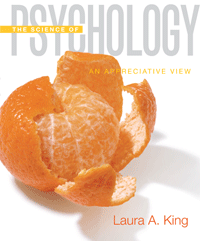| case study | An in-depth look at a single individual; also known as a case history.
|
 |
 |
 |
| control group | A comparison group that is as much like the experimental group as possible and is treated in every way like the experimental group except for the manipulated factor.
|
 |
 |
 |
| correlational research | A research strategy that identifies the relationships between two or more variables in order to describe how these variables change together.
|
 |
 |
 |
| dependent variable | A factor that can change in an experiment in response to changes in the independent variable.
|
 |
 |
 |
| descriptive statistics | Mathematical procedures that are used to describe and summarize sets of data in a meaningful way.
|
 |
 |
 |
| double-blind experiment | An experiment that is conducted so that neither the experimenter nor the participants are aware of which participants are in the experimental group and which are in the control group until after the results are calculated.
|
 |
 |
 |
| ecological validity | The extent to which an experimental design is representative of the real-world issues it is supposed to address.
|
 |
 |
 |
| ethnic gloss | Using an ethnic label, such as "African American" or "Latino," in a superficial way that portrays the ethnic group as more homogeneous than it really is.
|
 |
 |
 |
| experiment | A carefully regulated procedure in which one or more variables believed to influence the behavior being studied are manipulated while all other variables are held constant.
|
 |
 |
 |
| experimental group | A group in the research study whose experience is manipulated.
|
 |
 |
 |
| experimenter bias | The influence of the experimenter's own expectations on the outcome of the research.
|
 |
 |
 |
| hypothesis | An idea that is arrived at logically from a theory. It is a prediction that can be tested.
|
 |
 |
 |
| independent variable | The manipulated experimental factor in an experiment.
|
 |
 |
 |
| inferential statistics | Mathematical methods that are used to indicate whether data sufficiently support or confirm a research hypothesis.
|
 |
 |
 |
| internal validity | The extent to which changes in the dependent variable are due to the manipulation of the independent variable.
|
 |
 |
 |
| longitudinal design | A special kind of systematic observation that involves obtaining measures of the variables of interest in multiple waves over time.
|
 |
 |
 |
| mean | A statistical measure of central tendency that is calculated by adding all the scores and then dividing by the number of scores.
|
 |
 |
 |
| median | A statistical measure of central tendency that falls exactly in the middle of a distribution of scores after they have been arranged (or ranked) from highest to lowest.
|
 |
 |
 |
| meta-analysis | A method that allows researchers to combine the results of several different studies on a similar topic in order to establish the strength of an effect.
|
 |
 |
 |
| mode | A statistical measure of central tendency; the score that occurs most often.
|
 |
 |
 |
| naturalistic observation | Observation of behavior in real-world settings with no effort made to manipulate or control the situation.
|
 |
 |
 |
| operational definition | An objective description of how a research variable is going to be measured and observed.
|
 |
 |
 |
| placebo | A harmless, inert substance that may be given to participants instead of a presumed active agent, such as a drug, and that has no specific physiological effect.
|
 |
 |
 |
| placebo effect | The situation where participants' expectations, rather than the experimental treatment,
|
 |
 |
 |
| population | The entire group about which the investigator wants to draw conclusions.
|
 |
 |
 |
| random assignment | The assignment of participants to research groups by chance.
|
 |
 |
 |
| random sample | A sample that gives every member of the population an equal chance of being selected.
|
 |
 |
 |
| range | A statistical measure of variability that is the distance between the highest and lowest scores.
|
 |
 |
 |
| research participant bias | The influence of research participants' expectations on their behavior within an experiment.
|
 |
 |
 |
| sample | The subset of the population chosen by the investigator for study.
|
 |
 |
 |
| standard deviation | A statistical measure of variability that involves how much the scores vary on the average around the mean of the sample.
|
 |
 |
 |
| standardized test | A test that requires people to answer a series of written or oral questions or sometimes both.
|
 |
 |
 |
| theory | Theory stating that cells in the visual system respond to red-green and blue-yellow colors; a given cell might be excited by red and inhibited by green, whereas another might be excited by yellow and inhibited by blue.
|
 |
 |
 |
| third variable problem | The situation where an extraneous variable that has not been measured accounts for the relationship between two others.
|
 |
 |
 |
| validity | The soundness of the conclusions we draw from an experiment. In the realm of testing, validity specifically refers to the extent to which a test measures what it is intended to measure.
|
 |
 |
 |
| variable | Anything that can change.
|





